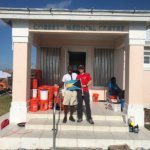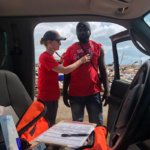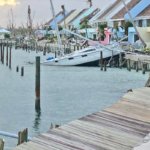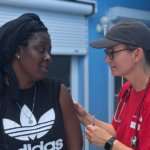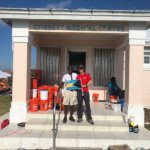Local doctor provides hurricane relief in the Bahamas
Sleeping on the porch of a hurricane-battered house with no electricity felt luxurious to Dr. Jean Andersson-Swayze—it was an upgrade from the previous nights she spent camping on the ground in a shanty town on Abaco, an island in the Bahamas that was suffering the effects of Hurricane Dorian. Andersson-Swayze was there as part of a medical rescue team led by Heart to Heart International; she made two trips this fall, one in the direct aftermath of the hurricane, and another in early November.
The washed-out home was a blessing, Andersson-Swayze said, because the porch was protected from the elements with a roof, and as she went to sleep and when she woke up in the morning, she could hear the sound of the waves from her oceanfront roost. The house, though badly damaged, was prime real estate on the water, and its owners generously allowed medical staff to sleep there for both of their relief trips.
“It makes you appreciate your warm cozy bed,” Andersson-Swayze said—a bed she appreciated even more after seeing what the Bahamian people were experiencing after Dorian. Conditions on Abaco are still dire, she said.
This was apparent as soon as Andersson-Swayze stepped off her flight in the airport.
“We were met by a crowd of people waiting to leave the island who had been waiting for several days…they were desperate to leave [the island]. So, we basically started providing care right after we got off the plane.”
Along with the rest of her eight-member team of physicians and support volunteers, Andersson-Swayze traveled around the shanty areas of the island as part of a mobile medical unit, helping people both with infections or critical care issues—like a man who had fallen off a roof in the midst of repairing a building—as well as maintenance care for conditions like blood pressure and diabetes.
The shanty town, which had a mostly Haitian population, was pretty bleak, she said. “The people are service people…and work very hard for very little money,” she said. Because the Haitian community on Abaco is largely undocumented, people suffering with medical issues didn’t seek help for fear of being deported and sent to Haiti, a country on the brink of civil war, and one that many had never visited in their lives. The situation there is “much like migrant workers in the U.S.,” Andersson-Swayze said.
In her regular life, Andersson-Swayze is a family care physician with Middlebury Family Health. She also regularly takes service trips to areas impacted by diseases or natural disasters. She made a trip to Sierra Leone to combat Ebola in 2015, and has flown to provide relief after hurricanes Dorian, Harvey, Maria, and Michael over the past decade. She has also performed humanitarian medical care in Haiti, and for Greece refugees and Bangladesh Rohingya. She said she is also planning a trip to work with migrants in Tijuana this month.
There are numerous ways people can help in the Bahamas, Andersson-Swayze said. After she wrote a Front Porch Forum post asking for donations and help, several Charlotters with specific skills approached her and are making tentative plans to go down and help; carpenters and builders are much needed.
The less-skilled in the art of building can contribute in other ways, the easiest and most effective being in the form of donations, Andersson-Swayze said. She suggests Heart to Heart International or The Bahamas Disaster Relief Fund, which was set up by the Bahamian Government. She also mentioned World Central Kitchen—they provided hot meals to both those suffering from the effects of the hurricane and the volunteers. “Somehow they were able to get their delicious food to us on Treasure Cay,” she said.
“I highly recommend this group, and they have a volunteer program if anyone is interested.”
Another relief suggestion seems a little too easy: “If you are looking for a good reason to take a beach vacation, it is important to know that many areas of the Bahamas, including Nassau, were completely unaffected by Dorian,” she said, “and taking a vacation there will help the local economy.”

